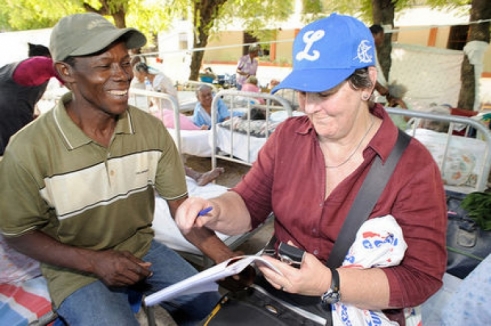
When a major humanitarian crisis strikes, such as the Pakistan floods or the Haiti earthquake, aid workers are first on the scene, often putting themselves at huge risk to help their fellow human beings.
Their vital contribution will be celebrated this week, on Thursday, 19 August – World Humanitarian Day.
HelpAge International is marking this event too, as thousands of aid workers – although most people wouldn’t think of it – are older people.
For instance, 75-year-old retired doctor Maung Maung Shien worked with HelpAge International in townships on the Ayeyarwaddy Delta in Myanmar after it was devastated by cyclone Nargis in 2008.
“Older people have knowledge, wisdom and experience”
He says: “Being an older person myself, I find I can communicate better with the older patients. I also know older people have knowledge, wisdom and experience, and are an underused resource in the relief effort.”
World Humanitarian Day is organised by the United Nations and this year’s theme, “I am a humanitarian aid worker”, has been chosen to highlight the people who work tirelessly in the field organising and delivering relief.
HelpAge International’s Emergency Programme Coordinator Margaret Chilcott said: “We have an image of aid workers as foreigners, yet in all emergencies the people at the frontline in the response are local people.”
Charge of the White Brigade
Sofia Alvarado belongs to the Brigadas Blancas (White Brigade) – a non-governmental organisation in Peru. “We’re called the White Brigade because of our grey or white hair,” she says.
In 2007, after the country was struck by an earthquake, Sofia and her older colleagues visited communities in and around Ica city.
She said: “When we visited camps and villages around Ica city, all of them were overcrowded, filled with tents of people facing the worst circumstances of their lives, without water or food.
“Being part of the White Brigades meant we could bring relief to those affected. We didn’t give money but we gave all what we had: our time and willingness to support others.”
Kizito Chiwala, Regional Emergency Adviser for HelpAge in Latin America, says: “These groups of older people organised communal cooking areas and distributed large numbers of meals to the communities affected.
“They were our best allies. They were very well organised and they referred us to areas where other aid agencies had not yet delivered aid.”
Age brings experience
HelpAge’s Margaret Chilcott has worked in emergencies for nearly 20 years.
She says: “Why at 62 am I still in humanitarian aid work? I guess the simple answer is that I can.
“I find my age brings to the work my experiences which help me to empathise with others’ joys and sorrows, such as losing a child. Age unlocks doors to people in cultures where women are not necessarily held in high regard.”
HelpAge International’s Chief Executive Richard Blewitt says: “World Humanitarian Day is a great initiative. It’s a good reminder to people who give and support humanitarian work, and to ourselves, about what we do, and of course why we do it.”
View Sophia Alvarado and our HelpAge humanitarian heroes in our “I Am A Humanitarian Aid Worker” photogallery
